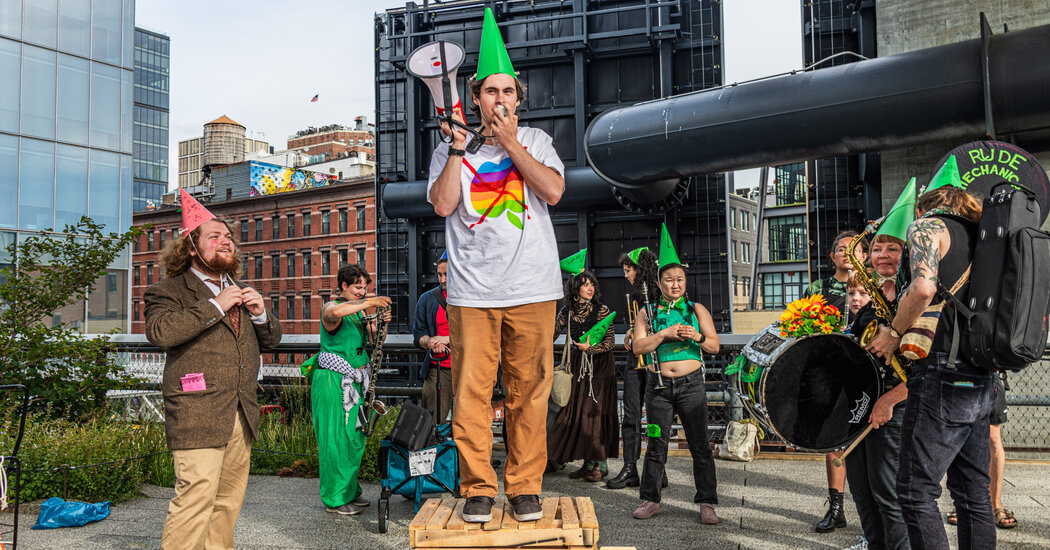On a recent Saturday, a group of about 100 people in conical gnome hats made of brightly colored manila envelopes gathered near the start of the High Line in the Meatpacking District in Manhattan and began to march south.
The occasion was the second annual “Scathing Hatred of Information Technology and the Passionate Hemorrhaging of Our Neo-liberal Experience” conference, organized by Lamp Club, an organization for people with Luddite tendencies, or at least aspirations.
The event was generally anti-technology, but why the gnomes?
“Because gnomes come from the earth,” Bucky Baldwin, one of the event’s organizers, shouted through a megaphone at the crowd, his mop of dark brown hair flopping as he emphasized each word.
Then the next question. Why lamps?
“Lamps just create that atmosphere,” said Jackie McVorran, who started Lamp Club in October 2023.
From the start, the group had a penchant for unorthodox gatherings. In keeping with the club’s name, Ms. McVorran, 19, did not want to meet in conference rooms or classrooms — places with overhead lighting. One of its first events was a “shoes optional” day at the New School campus where she and Mr. Baldwin, 21, met as students during an open mic night at the university cafe. They wanted to break down some of the modern anxiety around in-person interaction by putting people in a slightly unfamiliar context.
“Some people felt liberated by it, but other people were like, ‘That’s crazy. That’s nasty,’” recalled Ms. McVorran, a native New Yorker who studies psychology, philosophy and anthropology.
She was undeterred. She wanted to understand her classmates who had been so opposed to the event: “I think it all goes back to people feeling alienated from one another.”
The Lamp Club is part of a growing ecosystem of “neo-Luddite” groups across the country that encourage people to transform their relationship to technology. Other groups include the Luddite Club, APPstinence and Breaking the (G)Loom — organizations that, for the most part, were started not by parents wishing their teens would get off their devices but by the teens themselves, who fault phones for fraying human connections as well as accelerating inequality and climate change. There are now more than two dozen Luddite Clubs in North America, from Ithaca, N.Y., to Irvine, Calif.
“We’re all translating the Luddite ideology into different languages,” said Logan Lane, the founder of the Luddite Club in Brooklyn. “The spectacle of what Lamp Club is doing draws people in.”
Up until recently, Lamp Club used Instagram as a way to get the word out about its events — though the group’s page is mainly photos of the fliers its members printed up and pasted on street corners and in subways. “Our digital presence is a fabricated personality,” one Instagram post in April read. “Please meet with us in person.” Last month, they broke up with the platform in a message that read: “We Are Leaving Instagram Forever.”
“I just envision the world I want to live in with analog tools and live like that,” Ms. McVorran said.
“People are just sick of this march forward and having to view technology as progress,” said Caitlin Begg, a sociologist and founder of Authentic Social, a research lab that studies the effects of technology on everyday life. “They don’t want their time and attention to be commodified anymore.”
She compared the Lamp Club to the midcentury situationist movement, a coalition of artists and left-wing intellectuals who, as The New York Times once put it, “mixed Surrealism, Marxism and sometimes spectacular hedonism” to level their critiques.
Ms. McVorran, too, views the Lamp Club as a project that goes beyond people’s relationships with their phones. (She has a flip phone, while Mr. Baldwin still uses a smartphone — though he said he planned to start using a Light Phone, a minimalist device that doesn’t support social media sites or internet browsers.)
The group has an explicit anticapitalist bent and takes up larger social issues, like atomization and alienation.
Ms. McVorran points to moments of antisocial rudeness that have become commonplace: people on their phones during dinner, not acknowledging someone holding open a door, feeling uncomfortable with boredom. “People are isolated,” she said.
Susan Westbrook was visiting from Saratoga Springs, N.Y., with three friends when she stumbled on the High Line protest as it started. She and her friends were intrigued by the characters — she pointed to one Lamp Club member she said resembled a “wizard” — but also sympathetic to the message.
“We didn’t grow up with this technology, but these phones are so addictive,” said Ms. Westbrook, 66. “We also loved seeing all these young people taking a stand.”
Other happenings are more like conceptual protests in the vein of Bread and Puppet, the political theater project started by Peter Schumann in the 1960s. One evening this summer, for instance, several Lamp Club members, including Ms. McVorran and Mr. Baldwin, participated in a “dinner party” in a plaza at 1221 6th Avenue hosted by another Luddite-adjacent group, Free POPS.
The plaza is advertised as open to the public, but it’s operated by the Rockefeller Trust and comes with strict rules posted on a plaque at the corner of the building. An upscale steakhouse occupies the ground floor, with imposing windows looking out onto the concrete park.
“These spaces belong to the public,” Ms. McVorran said. “We wanted to remind everyone of that.”
She and the other members of the club — some are friends and classmates of Ms. McVorran’s and Mr. Baldwin’s, but others, of all ages, are from around the city — pride themselves on understanding exactly how far the rules can be bent to avoid being hassled by authorities.
Two members in yellow high-visibility vests toted clipboards with printouts of the plaza’s bylaws as well as a schematic that detailed the property line for the adjoining skyscraper. Others collected the lightweight metal tables and chairs that were scattered around the grounds and put them a few feet from the restaurant windows.
A torrential downpour started, but Ms. McVorran, Mr. Baldwin and more than a dozen others sat down to a mock meal while diners inside gawked. (A restaurant worker eventually lowered the shades.)
On this later afternoon at the High Line protest, as the march moved down the elevated pathway, the group collected a few participants — as well as some quizzical looks. Several people had no idea what the group was objecting to, while others tried to piece it together based on some of the signs and props.
“It’s about getting off social media,” a passerby said with confidence. His counterpart shrugged.
The group marched down the stairs at the south end of the park before doubling back up Washington Street and stopping in front of a Tesla storefront. They began a chant: “We will free the iPad babies, even if it gives us rabies.”
“People in my generation search for themselves through technology,” said Maya Giurgi, who joined Lamp Club last year after hearing about it from Ms. McVorran, a friend of hers. A trained dancer, Ms. Giurgi now leads movement classes for the club. “I’m trying to pay more attention to the ways I’m distracting myself or running away into my phone.”
The “playfulness” of the club, Ms. Giurgi, 21, said, made its events approachable and welcoming.
Not everyone was sympathetic. Carol, a 72-year-old hobby photographer from Forest Hills who declined to give her last name, scoffed at the protest. “I think it’s ridiculous,” she said, pointing to the ubiquitous technology being used to document and coordinate the demonstration. “They all have iPhones. I don’t get it.”
Khamani Brown, a student at the Fashion Institute of Technology, arrived on his bike as the event was winding down. “My dad called me and said I might be interested in what was happening,” he said. (His father had walked by earlier.)
Mr. Brown, 17, said he was interested in climate activism, and considered the overlap between his own work and the Lamp Club’s ethos. “I think it all goes together,” he said.
The protest ended with a rally outside the sprawling Apple store in the Meatpacking District. A mock trial was held for an iPhone and an iPad; both were found guilty and a masked executioner smashed them to pieces.
Mr. Baldwin, Ms. McVorran and others made impassioned speeches about the antisocial effects of technology. “The people in your phone aren’t real,” Ms. McVorran said. It was a plea for anyone within ear shot to engage with the world around them.
Behind her, dozens of people half-listened while they waited in line for the release of the new iPhone, gazing at their screens.
The post They’ve Come to Free the ‘iPad Babies’ appeared first on New York Times.




